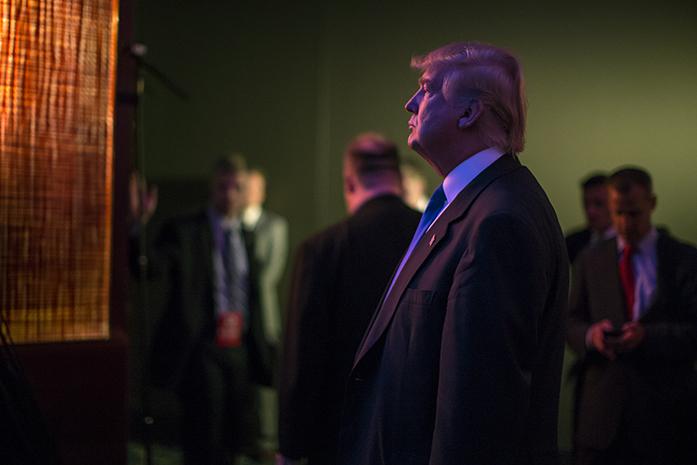by Logan Pillard
Trump’s address to a joint Congress on Tuesday night has been viewed as oddly presidential by pundits and celebrated as a change of tide from his 3 a.m. tweets and repetitive delegitimizing of the press. His address included praise for Stephen Miller and Trump’s writing staff, assisted by White House strategist Steve Bannon and Trump’s daughter Ivanka. Together, this team of nearly 70 contributors almost made the president of the United States not sound like a bigoted and ignorant nationalist with a vengeance against immigrants and minority groups alike.
Almost.
While Trump’s speech spoke of unity and cooperation among parties, his actions over the past month as president and throughout his controversial campaign provoke a warranted skepticism among Democrats and critics alike. Trump’s response? Bring in several individuals from minority groups he’s bashed over the course of his extensive two years of political experience, as if to say, “Come on everyone, drink the punch.”
Amid his reprimand of the Affordable Care Act, Trump called to the gallery to recognize Notre Dame sophomore and “rare-disease survivor” Megan Crowley. While the president praised Crowley, Trump’s reach across the aisle came off as insincere, after an incident involving Trump’s ridicule of disabled reporter Serge Kovaleski. Trump has refused to apologize his outlandish behavior toward Kovaleski, claiming that he never mocked the reporter, despite video evidence proving otherwise. Though his admiration for Crowley is praised by many supporters, Trump’s refusal to apologize to Kovaleski only shows his willingness to use individuals for political gain.
In an attempt to advocate school choice for disadvantaged black and Latino youth, he brought the crowd’s attention to a school-choice success story, Denisha Merriweather. Merriweather receive government vouchers to attend private school, a decision she said was “unlike anything [she] had experienced before.”
Though Merriweather succeeded from the government voucher programs, a policy brief by the National Education Policy Center found that school-choice literature “documents an unsettling degree of segregation — particularly in charter schools – by race and ethnicity, as well as by poverty, special needs, and English-learner status.” It also didn’t help that Trump transitioned straight into his call for “law and order,” a policy introduced by Nixon that led to the mass incarceration of racial minorities.
Finally, in what was arguably the most talked about moment of the night, Trump acknowledged the widow of Navy SEAL William Ryan Owens, who died in the failed Yemen raid last month that resulted in the death of more than 25 civilians. This is perhaps the coup de grace of Trump’s address, though a few holes need to be filled in to understand the true outlandishness of this.
Trump claims to be a champion of veterans, despite his attack on war hero Sen. John McCain during the 2016 election, in which Trump said, “He’s a war hero because he was captured. I like people who weren’t captured.” This is an act of outright disrespect toward the men and women who serve our country.
While Trump calls the raid in Yemen a “huge success,” Pentagon officials say no new significant intelligence resulted from the raid. It was our host-in-chief, who carelessly approved the raid over dinner without reviewing intelligence reports. It was Trump who sentenced Owens to death with his negligence of power. It was Trump who refused to take responsibility for the mass loss of life of both civilians and Owens. Let it be very clear: These words do not signal a new Trump but rather a smarter administration, whose members are willing to make political gains at the expense of minority groups and veterans alike. Resist.



